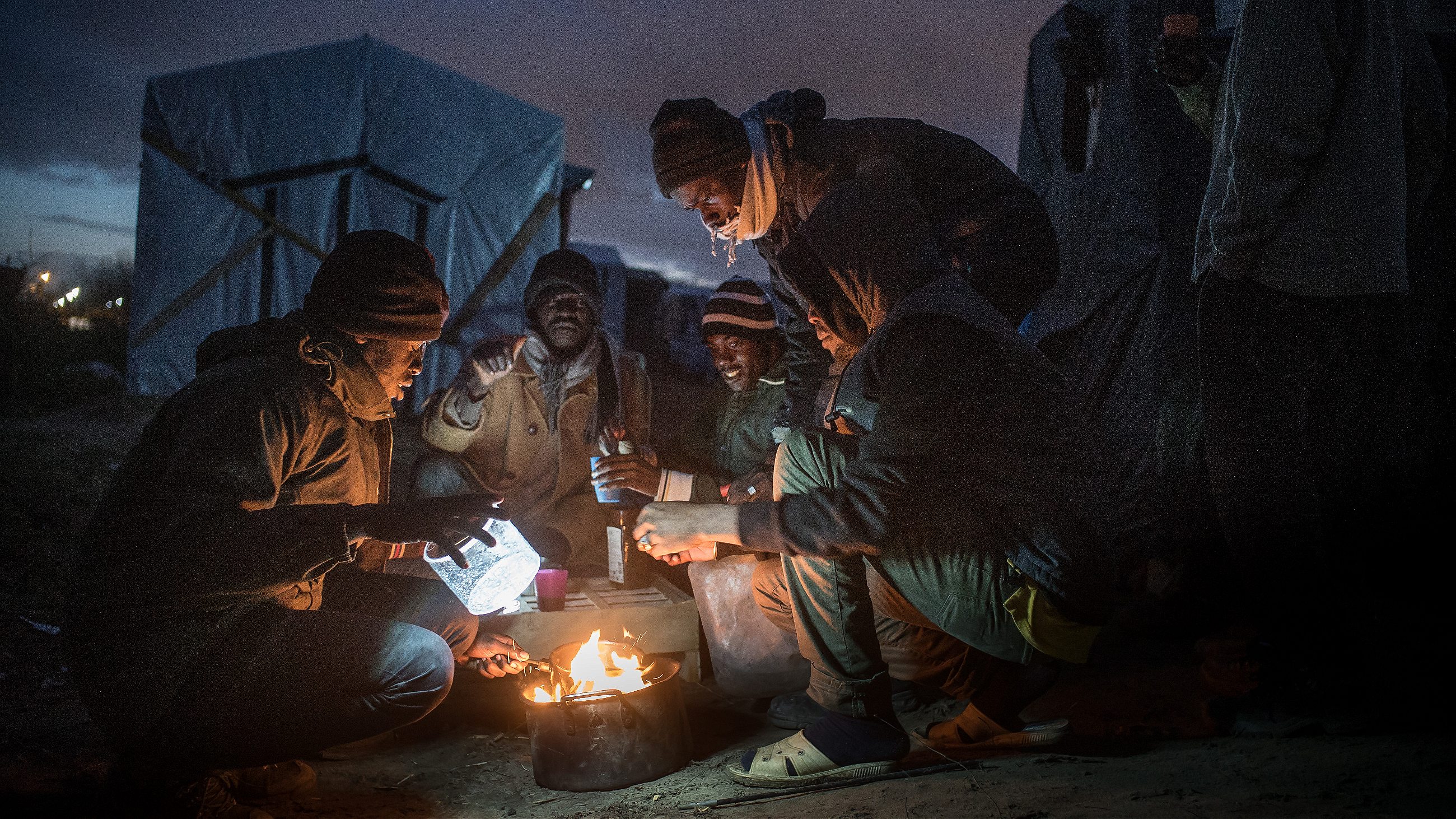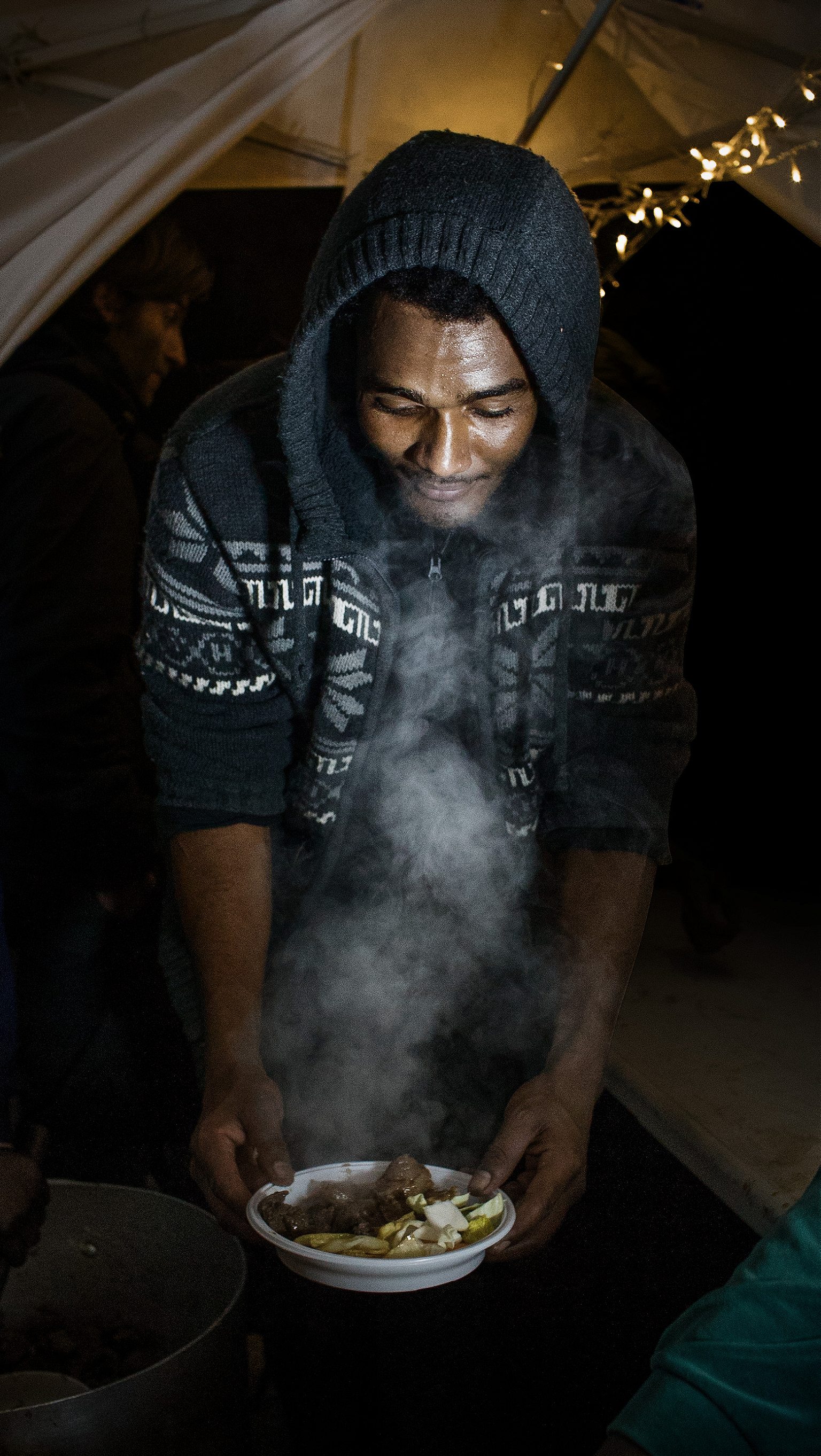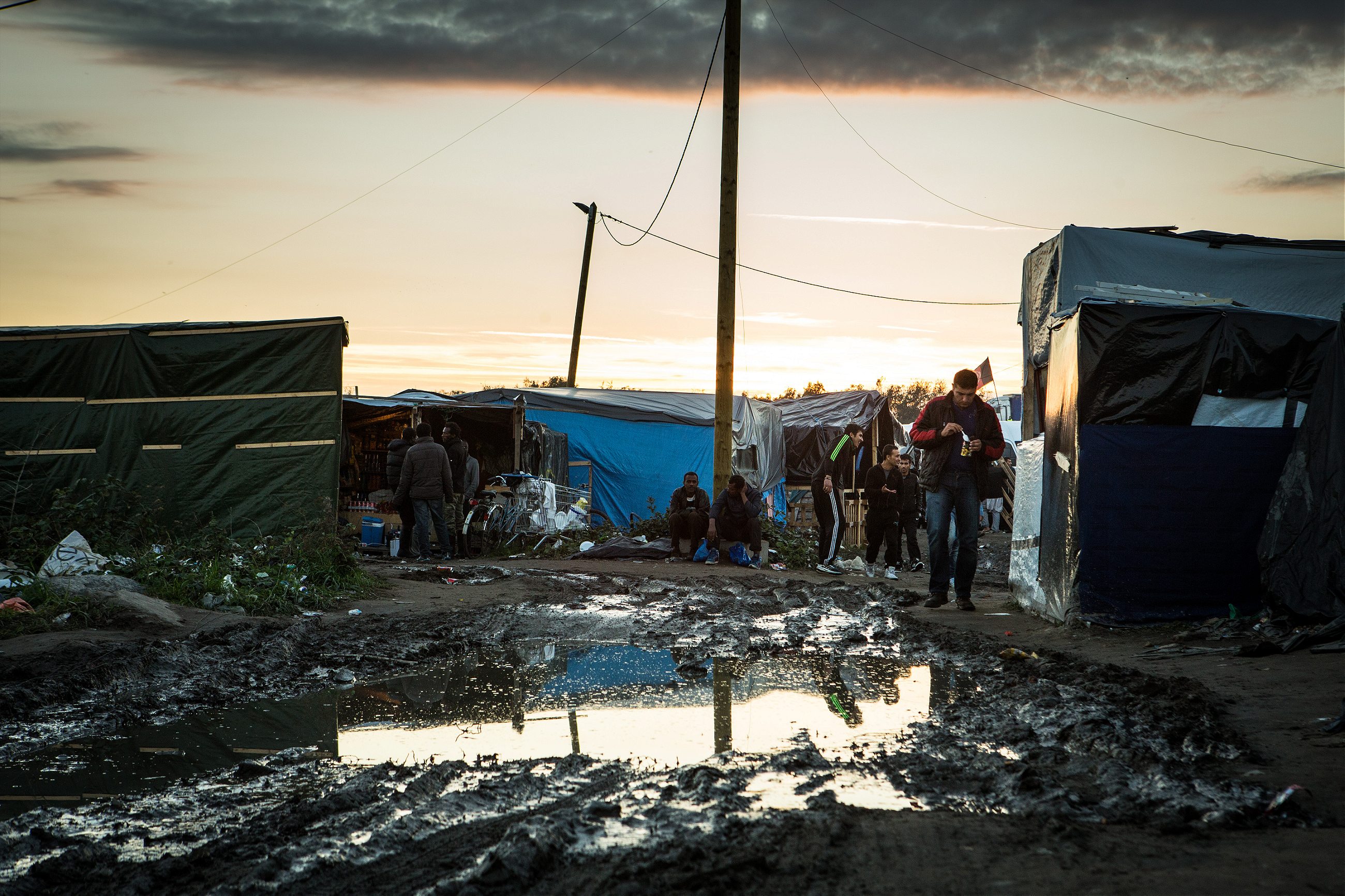As migrants are forced out of France’s most infamous refugee camp, an excerpt from the recent book Far Afield by Shane Mitchell looks at the meals and relationships created in the Jungle.
With the closing of the Jungle this week, a chapter ends in northern France for thousands of refugees who sought temporary shelter in a toxic landfill on the outskirts of Calais. This squalid encampment of tents, plywood shacks, vans, and overflowing portable toilets became home for both economic migrants and those escaping war-torn regions of the Middle East and North Africa.
Despite the muck and danger and disease, it was also one of the first places in Europe where many felt welcome for the first time in their panicked flight. Makeshift churches and mosques opened for prayer. Impromptu soup kitchens manned by multinational volunteers served hot meals. A London-based theater troupe set up a stage in a geodesic dome for visiting performance artists. Graffiti artist Banksy left his mark. So did neo-Nazi protesters. Tear gas and strobes from armored police vehicles often lit up the night as a black market in mobile phones and sneakers thrived next to the overpass leading to the Eurotunnel.
Inside makeshift restaurants, weary and battered men huddled to stay warm and longed for a taste of home. Some died in unsuccessful attempts to stow away in transport trucks or ships. Unaccompanied minors went missing. A pregnant woman miscarried. Iranian asylum seekers sewed their mouths shut on a month-long hunger strike to protest inhumane treatment. This was the Jungle I visited last year while researching my new book, Far Afield. It’s not a place about which to wax nostalgic. But with their fates in jeopardy once again as the French government disperses the last residents to a network of 400 “welcome centers” across the country, I can’t help but hope that their onward journeys end somewhere better than this place.
CALAIS, France—
“Before I try, I eat garlic,” said Hamada. “I take five pieces with me. I eat two after I get on the track and three near to the check point.” A gangly Sudanese man wearing a red “Dismaland” hoodie sweatshirt and worn sneakers, he guided me around standing puddles next to a row of overflowing portable toilets. “Why garlic?” I asked. “Because the guard dogs don’t like it,” he replied.
On an overcast morning spitting with rain, we walked along Afghan Way, lined with makeshift shops fashioned from plastic tarpaulins and scavenged pallets. Small grocers sold fruit, canned goods, energy drinks, and tobacco. Steam clouded the plastic windows of a hammam. Brightly colored hookahs sat on counters inside cafés. A new bakery tacked up a round piece of naan above its open doorway, the enticing smell of bread hot from a tandoor oven escaping. The rubble-strewn path closely paralleled Autoroute 216 leading to the port of Calais. Chain-link fence topped with razor wire protected the overpass, where Gendarmerie Nationale officers, in full riot gear, were positioned every few hundred yards.
This illegal encampment, widely known as the Jungle, emerged in an empty lot due east of the city’s industrial zone just as the refugee crisis in Europe reached unprecedented levels. Residents number in the thousands, representing diasporas from Afghanistan to Eritrea, most fleeing war, terror, conscription, prostitution, or human trafficking back home. Those who landed in Calais were there because of its proximity to England, perceived, rightly or wrongly, as being more tolerant of migrants who reach the scepter’d isle. The cliffs of Dover are visible on sunny days at the beach and the entrance to the Eurotunnel, where freight and passenger trains pass under the English Channel, is five miles away in the suburb of Fréthun, a Francization of “Free Town.” However, the British and French have spent millions building fences around the rail tracks and terminal rather than building a détente with those desperate for safe haven.

Most refugees took shelter in a sea of sodden tents flapping in the sharp winter wind. Smoke from trash fires mingled with the noxious plumes of a graphite electrode manufacturing plant on the other side of the autoroute. Health warnings and language lesson flyers were posted at the Coptic church and a library wryly named Jungle Books. There were two public water taps for cooking and washing. Shopping carts and bicycles were mired in mud. Toughened young men, some limping on crutches, heads down, avoided eye contact. Graffiti was scrawled everywhere. “Long live Kurdistan.” “I need go to U.K.” “Afghanistan is bleeding.” “No worry, eat curry.”
“Shawarma!” exclaimed Hamada. “This is my favorite.” A hunk of meat twirled on a rotisserie spit inside one of the cafés. Entering, he placed an order. The man behind the counter shaved off juicy pieces, and rolled them into lavash bread, along with chopped onions and tomatoes. After one bite, his face fell. “I don’t like it,” he said. “It’s not as good as home.”
Hamada was born in Khartoum. He walked across Sudan and Libya before finding passage to Italy and, eventually, Calais. Hamada has attempted to jump Folkestone-bound trains multiple times, and, more recently, paid human smugglers to hide in the back of a freight truck, venturing as far away as Hazebrouck on the Belgian border for the chance.
Earlier in the day, before sunrise, a motorist accidentally struck and killed another Sudanese refugee as he fled across the autoroute. “I’m sorry to hear about your friend.”
“Inshallah,” he replied.
“Where is he now?”
“The hospital. Authorities will notify his family to see if they want the body sent home. Or buried here.”
The next day, a text arrived from Hamada: We want to cook for you. The Sudanese area of the camp backed onto Chemin des Dunes, a rural road bordering the eastern edge of the Jungle. Opposite, farm fields lay fallow in winter. The sturdier structures were no bigger than a child’s playhouse. Some had modest picket fences and potted plants, bicycle racks, shelves to store street shoes and toothbrushes. Sleeping bags cleverly zipped as windbreaks in doorways. A dala game board—the Sudanese version of chess—fashioned from plywood and broken clay tiles left mid-play. One tent ballasted by a cracked gravestone. In a central courtyard, a lumma, or gathering space, contained a fireplace fashioned from a steel drum.
Hamada introduced his neighbors. They fussed over bright-eyed Yarra, crawling around in the semi-darkness seeking her teddy bear. The Sudanese refugees considered the toddler incredibly lucky, as she was taken from the hospital in which she was born just before it was bombed. Her nickname is “Euro.” “Like the coin,” said Rasha, a middle-aged woman wearing a purple knit scarf and pierced earrings.

Later on, Rasha unloaded groceries we had purchased in one of the less primitive private kitchens. She set a pot on a burner and sliced onions expertly. She flipped her scarf out of the way while mincing lamb for the mullah robe, or yogurt stew. “We use dried meat at home,” she explained. “And sometimes dried okra.” I told her the lamb wasn’t halal. “Then, we will just put in a little, for flavor.”
The meat sizzled in oil. Hamada dropped peeled garlic cloves into an empty plastic water bottle and then smacked it repeatedly against a table, a neat trick for pulverizing the contents. Rasha added it to the stew, along with onions, tomatoes, yogurt, and finally stirred in peanut butter. As it simmered, she mixed flour with oil, salt and water, and then pounded away with a yardstick to make aseeda, a doughy porridge beloved by Saharans and Middle Easterners. By this time, men gathered outside, waiting for a treat. They ate quickly, scooping up the contents of the pot with the first two fingers of their right hands. Rasha neglected to mention the lamb’s questionable grace. To me, the stew tasted overwhelmingly of peanuts, but everyone else enjoyed it immensely.
After finishing with evening prayers, Hamada and two friends, Ibrahim and Algoks, urged me inside the lumma. It was snug with cast-off bar chairs, a coffee table and a real stove. Two French aid workers sat on a couch with a Syrian translator named Ahmed. Cherubic Ibrahim dunked fresh tea bags into boiling water and added powdered cinnamon. Lanky Algoks handed me a mug. I thanked him. “No thanks for duty,” he replied kindly. The Sudanese heaped sugar from a bowl. Spoons clattered in mugs. I lifted my tea to the hosts. “Cheers.” The Parisian women clinked their mugs, exaggerating for effect the Gallic ritual of eye contact during a toast. The Sudanese followed, beaming.
“Haraam,” said Ahmed, sternly.
“Excuse me?”
“We do not say ‘cheers.’ It is forbidden.” The Sudanese looked sheepish.

Sunday was a busy night in 3 Idiots. Shoes were left in piles on the dirt floor, as tired men leaned back on raised platforms upholstered with sleeping bags. Some sipped chai from plastic cups, others smoked hand-rolled cigarettes while waiting for their cell phones to charge. A chandelier powered by generator hung from the ceiling. Everyone stared at the flatscreen television as actor Shah Rukh Khan dangled off a skyscraper in Happy New Year, the Bollywood blockbuster about a jewel heist.
Ali offered a plate of jalebi, fried sweets common to street stalls in his part of the world, to me and Hamada. The dark-haired economics major from Peshawar learned to cook from his mother. “In Pakistan, I helped my mum in the kitchen,” he grinned. “She said I would make a wife very happy someday.” As I bit into one of the jalebis, sticky with syrup, Ali showed me pictures of his brothers back home. Originally, there were nine, but one died during a suicide bombing two years before.
“We came here for trying U.K.,” he said. “It was very difficult and I had lots of problems. So I think with my other friends, let’s open a restaurant or shop.” (The name 3 Idiots references a popular film rather than the acuity of its owners.) While Ali supervised the kitchen, Gulsher, a stocky man in his mid-twenties, played host, greeting newcomers with backslaps and bear hugs. Osom, their third partner, tended the adjacent shop.
Ali prepared the same menu every night. Plain basmati rice, spinach saag, kidney bean and lentil dal. Hot bread delivered from the new bakery across the pathway. Among the babel of dietary laws and requirements, French fries were the lingua franca of lunchtime. Salty, hot, comforting; everyone in the Jungle ate them. But Ali’s fried chicken was a miracle. Better than Popeye’s, better than KFC. World-class fried chicken. Maybe Michelin-star fried chicken. (The chicken was French, after all.) Here, atop a toxic landfill, mired in mud and muck, in a makeshift kitchen lacking running water or refrigeration, was a bird to sing about. A spicy paste clung to pieces of meat, juicy without being greasy. What do you crave when you can’t go home again? Or worse, fear being sent back? Perhaps this drumstick, DayGlo red with spices.
Gulsher introduced Osom. A thin Pakistani with graying hair, he sat surrounded by shelves filled with cooking oil, Fanta, lemon juice, and boxes of cookies. “Where did you meet Ali and Gulsher?” I asked.
“We’re all from one region,” he said. “And we accidentally met here, but I knew Gulsher’s brother before.” I pat a stuffed toy tiger, as big as a standard poodle, crammed among the dry goods. “And how did he get here?”
“This jungle creature has eaten a lot of humans,” Osom grinned. “Where the bushes are, this means ‘jungle’ in Hindi and Pashto. Sometime we hear rumors the government will end this Jungle but where will they take these people? They cannot drop them in the city. Jungle will survive.”
Ali pulled me into the kitchen to show me his secret recipe. Nusrat Fateh Ali Khan, the Pavarotti of Sufi devotional music, wailed on his phone. “I make the masala in the night,” he instructed. “Then put the chicken in so it catches the sauce and makes it more tasty.” He picked up a chicken leg and dangled it over a wok filled with oil. The chicken bubbled in the oil, fiery red masala paste puffing. “Twenty minutes and it will be done.” But I had a train to catch. The chicken wasn’t ready so Ali wrapped another, already cooked piece in foil. “Take it with you, auntie.”
Outside 3 Idiots, blue strobes from tactical vehicles lit the horizon. Hamada, having appointed himself my bodyguard, escorted me through the black market, which was in full swing at a crossroads close to the autoroute overpass. While the long-term survival of the Jungle is dubious, and despite tear gas attacks or bulldozers at the door, on this night it was a nascent border town in full flourish. Hamada and I weaved around tents next to piles of discarded clothing, and wound up on Route des Gravelines, where most volunteers left their cars. We shook hands. As Hamada turned back into the darkness, he bid me goodbye. “Arrive safely.”
Adapted from FAR AFIELD Copyright © 2016 by Shane Mitchell. Photographs copyright © 2016 by James Fisher. Published by Ten Speed Press, an imprint of Penguin Random House LLC.